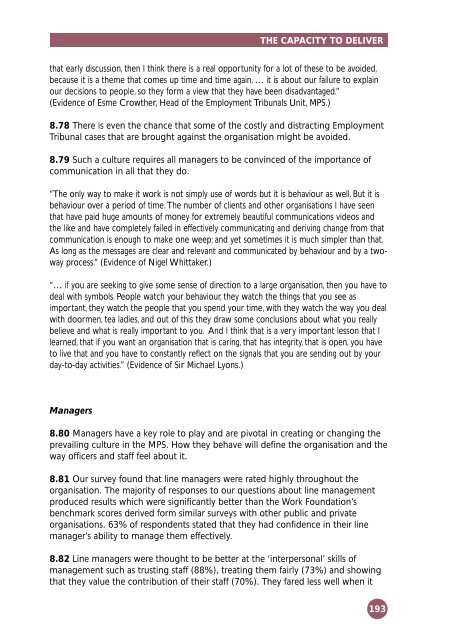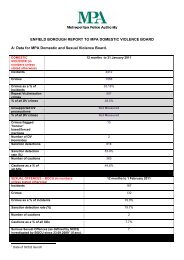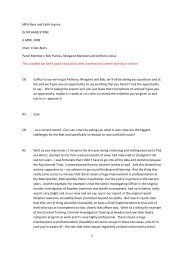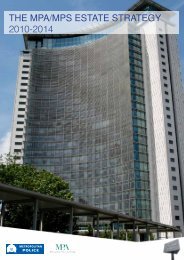Final Report of the Morris Inquiry: The Case for Change
Final Report of the Morris Inquiry: The Case for Change
Final Report of the Morris Inquiry: The Case for Change
Create successful ePaper yourself
Turn your PDF publications into a flip-book with our unique Google optimized e-Paper software.
THE CAPACITY TO DELIVER<br />
that early discussion, <strong>the</strong>n I think <strong>the</strong>re is a real opportunity <strong>for</strong> a lot <strong>of</strong> <strong>the</strong>se to be avoided,<br />
because it is a <strong>the</strong>me that comes up time and time again, … it is about our failure to explain<br />
our decisions to people, so <strong>the</strong>y <strong>for</strong>m a view that <strong>the</strong>y have been disadvantaged.”<br />
(Evidence <strong>of</strong> Esme Crow<strong>the</strong>r, Head <strong>of</strong> <strong>the</strong> Employment Tribunals Unit, MPS.)<br />
8.78 <strong>The</strong>re is even <strong>the</strong> chance that some <strong>of</strong> <strong>the</strong> costly and distracting Employment<br />
Tribunal cases that are brought against <strong>the</strong> organisation might be avoided.<br />
8.79 Such a culture requires all managers to be convinced <strong>of</strong> <strong>the</strong> importance <strong>of</strong><br />
communication in all that <strong>the</strong>y do.<br />
“<strong>The</strong> only way to make it work is not simply use <strong>of</strong> words but it is behaviour as well. But it is<br />
behaviour over a period <strong>of</strong> time. <strong>The</strong> number <strong>of</strong> clients and o<strong>the</strong>r organisations I have seen<br />
that have paid huge amounts <strong>of</strong> money <strong>for</strong> extremely beautiful communications videos and<br />
<strong>the</strong> like and have completely failed in effectively communicating and deriving change from that<br />
communication is enough to make one weep; and yet sometimes it is much simpler than that.<br />
As long as <strong>the</strong> messages are clear and relevant and communicated by behaviour and by a twoway<br />
process.” (Evidence <strong>of</strong> Nigel Whittaker.)<br />
“… if you are seeking to give some sense <strong>of</strong> direction to a large organisation, <strong>the</strong>n you have to<br />
deal with symbols. People watch your behaviour, <strong>the</strong>y watch <strong>the</strong> things that you see as<br />
important, <strong>the</strong>y watch <strong>the</strong> people that you spend your time, with <strong>the</strong>y watch <strong>the</strong> way you deal<br />
with doormen, tea ladies, and out <strong>of</strong> this <strong>the</strong>y draw some conclusions about what you really<br />
believe and what is really important to you. And I think that is a very important lesson that I<br />
learned, that if you want an organisation that is caring, that has integrity, that is open, you have<br />
to live that and you have to constantly reflect on <strong>the</strong> signals that you are sending out by your<br />
day-to-day activities.” (Evidence <strong>of</strong> Sir Michael Lyons.)<br />
Managers<br />
8.80 Managers have a key role to play and are pivotal in creating or changing <strong>the</strong><br />
prevailing culture in <strong>the</strong> MPS. How <strong>the</strong>y behave will define <strong>the</strong> organisation and <strong>the</strong><br />
way <strong>of</strong>ficers and staff feel about it.<br />
8.81 Our survey found that line managers were rated highly throughout <strong>the</strong><br />
organisation. <strong>The</strong> majority <strong>of</strong> responses to our questions about line management<br />
produced results which were significantly better than <strong>the</strong> Work Foundation’s<br />
benchmark scores derived <strong>for</strong>m similar surveys with o<strong>the</strong>r public and private<br />
organisations. 63% <strong>of</strong> respondents stated that <strong>the</strong>y had confidence in <strong>the</strong>ir line<br />
manager’s ability to manage <strong>the</strong>m effectively.<br />
8.82 Line managers were thought to be better at <strong>the</strong> ‘interpersonal’ skills <strong>of</strong><br />
management such as trusting staff (88%), treating <strong>the</strong>m fairly (73%) and showing<br />
that <strong>the</strong>y value <strong>the</strong> contribution <strong>of</strong> <strong>the</strong>ir staff (70%). <strong>The</strong>y fared less well when it<br />
193





![Appendix 1 [PDF]](https://img.yumpu.com/51078997/1/184x260/appendix-1-pdf.jpg?quality=85)

![Transcript of this meeting [PDF]](https://img.yumpu.com/50087310/1/184x260/transcript-of-this-meeting-pdf.jpg?quality=85)
![Street drinking in Hounslow [PDF]](https://img.yumpu.com/49411456/1/184x260/street-drinking-in-hounslow-pdf.jpg?quality=85)








